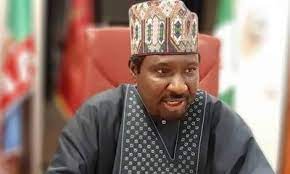President Muhammadu Buhari Tuesday announced the administration’s borrowing plan for 2020/22 fiscal years even as Senate commenced the debate on the consideration for the $30bbilion loan request by the president at Tuesday’s plenary. Abdulrhaman Zakariyau writes.
3-year borrowing plan
Though details of the borrowing plan were scanty, the president disclosed this at the signing ceremony of the 2020 Appropriation Bill into law. The president the 2020 budget provided for aggregate expenditures of N10.594 trillion, an increase of N263.95 billion over the proposal by the executive which was submitted to the lawmakers in October 2019.
“We have examined the adjustments and may revert to the National Assembly with a request for a Virement or other relevant amendments. With today’s global oil market outlook and our strategic approach to revenue growth, we are optimistic that we will be able to finance the 2020 Budget.
“However, being a deficit budget, an appropriate 2020–2022 Borrowing Plan will be forwarded to the National Assembly, in due course,” he said.
Atiku kicks
Shortly after the announcement, former Vice President and presidential candidate of the PDP in the last general elections, Atiku Abubakar, in a statement he personally signed, described the borrowing habit of Nigeria as frightening added that “It is frightening, not just because of the amount, but because after such unprecedented borrowing, we have emerged as the world headquarters for extreme poverty and the global capital for out of school children. It begs the question: what were the funds used for?
“The fact that Nigeria currently budgets more money for debt servicing (₦2.7 trillion), than we do on capital expenditure (₦2.4 trillion) is already an indicator that we have borrowed more money than we can afford to borrow. And the thing is that debt servicing is not debt repayment. Debt servicing just means that we are paying the barest minimum allowable by our creditors.
“And while spending 50 percent of our current revenue on debt servicing, this administration wants to take further loans of $29.6 billion! To say that this is irresponsible is itself an understatement.
“Even if this administration borrows $1 trillion, it will never be enough because their challenge is one of capacity. They are not using the funds they already have wisely. They do not need more debt. They need more intellectual capacity.
“The money the Muhammadu Buhari administration wants to borrow to fund its Medium Term Expenditure Framework (MTEF) could be acquired without sinking the nation into further debt. All it requires is visionary leadership and business acumen.
“While there is scant information in the Medium Term Expenditure Framework for what the loan would be used for, I could not help but read a communication from the Presidency to the effect that one of such projects would be the digitalization of the Nigerian Television Authority and other similar projects.
“Spending revenue on such projects would be foolish, but spending loans in such a manner is nothing short of foolhardy. The Nigerian government does not have a good record of running businesses, and a public television network is unlikely to yield the type of income that would justify taking out loans to digitalize it. Besides, is that a priority, when we have 12 million children out of school? Like I said, capacity, not revenue, is the problem.
“And in proof of this, I offer the example of how this administration took delivery of $322 million Abacha loot in 2018 and claimed it shared it out to poor Nigerians, only to obtain a $328 million loan from China, allegedly for ICT development the very next month. How do you share out $322 million and then borrow $328 million? Who does that? At the risk of repeating myself, it is clear that no amount of money, whether from revenue or borrowings, will be enough for an administration that lacks capacity.
“So, what must Nigeria do now? Rather than profligate borrowing, what Nigeria needs to do is restore investor confidence in our economy. Key to that is respecting the independence of key institutions, such as the Judiciary and the Central Bank of Nigeria. Both of these institutions are now the captives of Buhari and his cabal, and though they are loathe to admit it, they cannot take one step without watching their backs.
“We need to pay heed to Benjamin Franklin’s advice that “he that goes a borrowing goes a sorrowing”. I call on Nigeria’s youth to identify the Senator representing their senatorial zones and write to them, urging them to vote against this request. Do this, because it is you and your children that will pay back these loans that would be squandered by this ravenous cabal who do not have the word enough in their vocabulary”.
NGF’s position
Barely 48 hours after the president raised the issue of further borrowing, the governors of the 36 states of the federation on the platform of the Nigeria Governors’ Forum (NGF) expressed reservation on the plans to secure $30bn loan.
The chairman of the forum, Dr Kayode Feyemi, who is the governor of Ekiti state spoke on the forum’s position saying any further loan request from the president may not receive favourable attention from its members.
Though he spoke on sundry matters including constitutional issues its members discussed at the meeting held in Abuja, he insisted that the NGF as a body would decline any appeal for further borrowing irrespective of the purpose and objective of the planned borrowing.
He said the governor would distance themselves from the exercise because it has nothing to do with the states and therefore cannot be involved in deliberations in that regard.
NGF’s Chairman and Governor of Ekiti State, Kayode Fayemi made the clarification after a meeting of the group in Abuja on Wednesday night. He said: “You know the borrowing plan is a Federal Government borrowing plan.
“It is not the federation’s borrowing plan. The federal government’s borrowing plan to the National Assembly is really a matter between the federal government and the National Assembly. It is not something that we want to put ourselves in between. We don’t want to comment on that.”
The communique reads: “We, members of the Nigeria Governors Forum (NGF), at our meeting held today at the NGF Secretariat Abuja, deliberated on several issues and resolved as follows:
“The forum received an update from the Auditor General of the Federation (AuGF) and the World Bank team on the State Transparency, Accountability and Sustainability (SFTAS) Independent Verification Assessment (IVA) exercise conducted across states.
“The Independent Verification Assessment (IVA) team highlighted among others, activities of the FY2018 Annual Appraisal Assessment to be concluded in January 2020 while the transfer of 2018 grants to States will take place in March 2020.
“As a SFTAS implementing partner, the Nigeria Governors’ Forum Secretariat will carry out regional sensitization workshops in March 2020 and kickstart the provision of technical assistance to States through customized just-in-time advisory and training, exchange visits and peer learning events.
“The forum received an update on the health priorities of the forum especially Universal Healthcare, Nutrition and on the Polio Eradication Initiative, including the Seattle Declaration.
“Governors reiterated their commitment to an effective implementation and tracking of the Seattle commitment
“The Forum received a briefing on the UK-Africa Investment Summit 2020 from the UK Foreign Office led by Harriet Thompson, the UK Deputy High Commissioner to Nigeria.
“The summit will be hosted by the UK Prime Minister and will bring together businesses, governments and international institutions to showcase investment opportunities in Africa.
“Members expressed optimism for deeper opportunities in various sectors of the economy including agriculture, infrastructure, manufacturing, health, education and financial services; and committed to strengthening the forum’s partnership with the UK’s CDC Group and the Private Infrastructure Development Group (PIDG) to help bridge relations between Nigerian and UK companies.
“The forum received a delegation of the Conference of Speakers of the State House of Assembly and had fruitful discussions on some constitutional matters.
“The forum received a presentation from the Ministry of Finance, Budget and National Planning, on the Geo-Referenced Infrastructure and Demographic Data for Development (GRID3) programme in Nigeria – a programme designed to strengthen the application of geospatial data for evidence-based decision making in the country.
“The National Coordinator of GRID3, Inuwa Yau, also highlighted several applications of the programme in priority areas of government including food security, health coverage, financial inclusion, survey and demographics and education.
“Finally, state governors commended the Ministry of Finance, Budget and National Planning for coordinating the GRID3 programme which will be central to development-planning going forward.
“Members pledged to work with the ministry by providing the institutional arrangements in all states to ensure that each state supports the generation and management of geospatial data.
“This will ensure that state governments have the right information in identifying where people live and how critical services can be most equitably and effectively allocated.”



